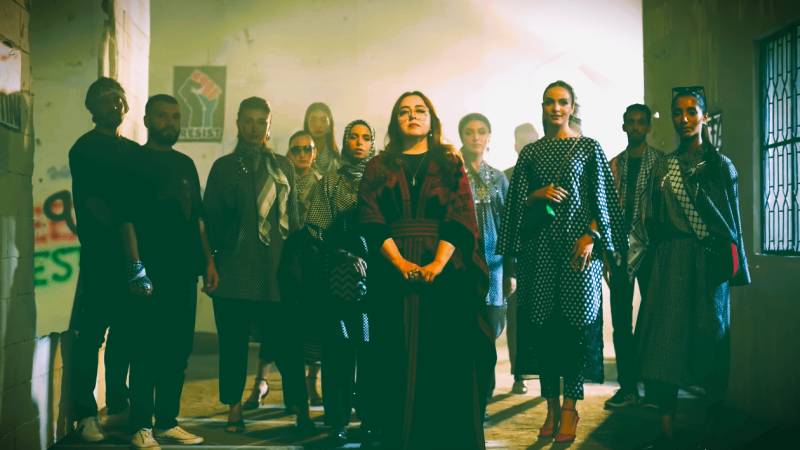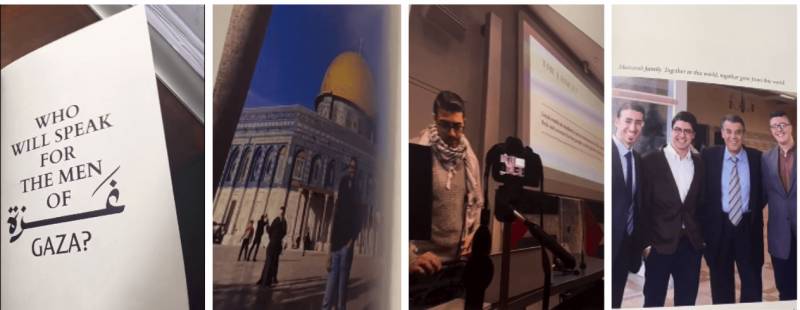
For the past ten months, the Israeli army and hasbara machine has been belligerently glamorising a genocide of Palestinians in Gaza. Addressing the genocide is what the Pakistani publishing industry has done. Commercialising genocide is what designer Maria B has now done.
The question here is not who the bigger hero is. The issue is the grotesque display of disrespect for a country founded on humanitarian principles.
Let's take a step back and see the major global events which has created shock waves, the war in Palestine. Since October 2023, the planet has been soaked in blood and tears, watching as unfathomable horrors were committed against victims of the war in Palestine. At the risk of sounding like an idealist, all life is sacred, as I do believe every living form has an equal claim to the beauty of life on earth. Which is why I believe there are victims on both sides, the Israeli and Palestinian, but the scales of justice are so grossly imbalanced against Palestine that there is a need to speak up for the Palestinian people. But there is a way to do it - plenty of examples of which can be found the world over, some have even become viral.
How did Pakistanis do it? Massive credit must be given to Pakistani publishers and authors for being the first in the public realm to take a stand when the rest of the world was sifting between who was with or against Hamas.
Before I detail how these brave people came to the fore before anyone else, let's put their bravery into context. Pakistani publishers are shunned internationally simply due to their geography. Pakistani authors barely get their query letters completely read, and they're chucked as soon as the line 'I'm a writer based in Pakistan' comes up.
At home, Pakistan's publishers do what they do simply for the love of the written word. Contrary to what some say, capitalism does not serve us well, and we only need to look at the online discourse scorning the local industry to understand that anything put forward is rarely championed. I invite such people to accompany me to the printers to witness the reality that strips one of all dignities and niceties simply to put forward a product that actually advocates for creative freedom.
So then, why would Pakistan's literary industry step forward? Because it was the right thing to do. We saw author Musharraf Farooqui step forward when he gave up funding for a project that aimed to spread literacy amongst children. I almost wept when I read his statement, knowing that here was a Pakistani publisher bringing on another layer of discrimination but also at what was being sacrificed – local children losing out on a chance at literacy because of local state and societal failure.
For some of us, our privilege and literary presence might act as a buffer against repercussions but then what of those brave writers who contributed to the global call for letters to Palestine that I published as an anthology
Then there was Bilal Zahoor, who led the way in signing petitions condemning the war. Bilal Zahoor's Folio Books is a gift to the country. Upholding leftist literature, Folio's documentation of our unsung heroes who fought for the liberties we take for granted today, in hopes future generations may one day could be grateful for this work. Bilal's story is one of the sole publishers seeking to build international relationships to single-handedly change Pakistan's image as a literary country. For Bilal to do that means the international publishing industry is already unfriendly towards Pakistan, and will possibly view him with the additional burden stemming from the limiting lens of 'Against Hamas Or Not?' which, as we all know, is a choice between who to support, Israel or Palestine respectively.
Next, we saw Ananke print Pakistan's first international e-book publication titled 'Koi Hai: Letters to Palestine'. Before the scoffing begins, this act of bravery is incredible because Ananke is a digital media entity based in the UAE and is single-handedly run by a sole woman, Sabin Muzaffar. Against the backdrop of the normalisation of ties between the Middle East and Israel, the UAE has remained cautious over the conflict. Thus, to publish such a book and to make it freely available for the world to read and download is no small act of humanitarianism and bravery.
After that, we have Ala Books by Taiba Abbas, where she released 'Who Will Speak For The Men Of Gaza?'. They say a picture speaks a thousand words, and Taiba took that literally. The book is replete with images documenting Maisara AlRayyes, it pays homage to the men of Palestine who have shown the world what humanity looks like. On January 31, on Maisara's birthday, Taiba held the proof copy of the book for the first time in her hands. With all proceeds going to Palestine, Ala Books was also one of the first Pakistani publishers to join the Publishers For Palestine collective.

Some might argue that for some of us, our privilege and literary presence might act as a buffer against repercussions but then what of those brave writers who contributed to the global call for letters to Palestine that I published as an anthology (the e-book published by Ananke as written above)? Writers from all over the world sent in letters, poems, essays, images and translations to express their solidarity and a majority of them risked university applications and societal backlash.
From children under the age of 10 to established professionals, these contributors do not have the same buffer, but that's where we, with our privilege and clout, come in to protect and carry the work forward. Which is why, in this anthology, it was heartening to see local Pakistani authors and publishers come out in full force, each one risking their talent and professions forever to be condemned by the international community for standing up against genocide.
And then we have Maria B.
The act itself, some argue, is noble. Prize winning in fact. Raising money for Palestine. But then I wonder: if that was the case, why dress (excuse the pun) it up as a fashion video? There is something utterly grotesque in picking out the music, dolling up models, designing clothes with the keffiyeh and cheap imitation of Palestinian embroidery, all the while reaching heightened levels of excitement about the moral validation (by whom? Zaid Hamid… again?), all inspired by a genocide.
Today, as someone who has documented the rise of an industry which ought to be recognised as Pakistan's best element, I can easily say it has died with a member like Maria B commercialising a genocide
Some might say: oh well, Bella Hadid wore a dress made up of the keffiyeh. Yes, she did. She wore it as a Palestinian committing an act of resistance in a region where Palestine's misery does not exist. Forget mattering; it does not exist. For her to do that was a glorious act of resistance, especially in an industry where fashion brands such as Zara featured Palestinian deaths as a prop, mere accessories to generate sales.
To think of the videos of babies' bodies turning to ash, the beheaded children, limbs reduced to ribbons, a child's eyeball popping out of its skull, where bodies have been shredded to an extent that they are handed over in bags by weight, screams of humans burning alive, inspired a fashion collection has outdone sweatshops and blood diamonds.
For Maria B to do such a thing, I wonder who is she resisting against? Pakistanis? The same country which brought forth the bravest publishers who were the first to actively take a stand long before any other industry? Is she advocating in Pakistan to raise resistance in Pakistan for Palestine? Sorry, but sister is not only late to the game, she's satirising it. For Maria B, being the Face of Pakistani Resistance For Palestine is the kind of satire Spitting image could never have ever dreamed of.
If anyone looks at the history of Pakistan's fashion industry, it came about as an organic movement for liberation and creativity. It paved the way for the country's pop music, opened up the media in print publications and catapulted grassroots craft (from where it began) to the global level, opening up the world to South Asian fashion.
It was much more than what it has become, as today, the creative aspect has been curtailed in the name of commercialisation and gimmickry. Today, as someone who has documented the rise of an industry which ought to be recognised as Pakistan's best element, I can easily say it has died with a member like Maria B commercialising a genocide.
Arshad Nadeem's record can take a back seat because Maria B can be crowned as the record-setter for setting a new low in grotesque displays of acts against humanity.
FULL DISCLOSURE: I am the founder of ZUKA BOOKS, which is also part of the Publishers for Palestine. 'Koi Hai: Letters to Palestine', the print version was published by ZUKA in December 2023. The book is not for sale because we do not believe in commercialising genocide. If you would like to read or learn more about the project, the e-book version is available for free here.

